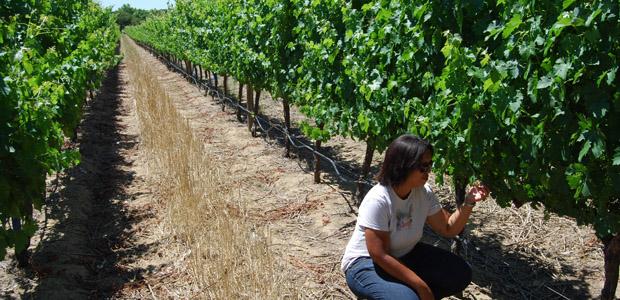Once the province of whites, Black South Africans embracing wine
Erna Witbooi crouches by a row of vines in a vineyard in Stellenbosch, South Africa. Witbooi is a researcher at the University of Stellenbosch. She says she’s the only black academic in viticulture in all of South Africa. (Photo by Anders Kelto.)
In South Africa many things divide along racial lines. That includes alcohol consumption.
Wine drinkers in South Africa are traditionally white, but the culture is starting to change as black wine researchers and consumers are growing.
Black South Africans have traditionally favored beer, or so the stereotype goes. But that might be starting to change.
At a wine bar in Sea Point, near downtown Cape Town, people sip wine in comfortable lounge chairs. The scent of the nearby Atlantic Ocean drifts in. Most of the people at this wine bar are black.
“I’m just into my white wines, my Chenins, my Sauvingon Blancs especially — I find it so refreshing, so crisp,” said Latoya Marivate, a patron who came with a group of friends. “I like my Sauvignon Blancs nicely chilled on a hot sunny day.”
In South Africa, more than 95 percent of the country’s vineyards are white-owned.
Almost all the wine makers are white. And most people visiting the dozens of vineyards near Cape Town are white. But South Africa’s black middle class has been growing steadily since the end of Apartheid, and more blacks can now afford to buy wine.
Latoya Marivate said many of her black friends are embracing the culture.
“People are appreciating it more and are collecting wines and going to wine farms, just enjoying the experience of just wine and the lifestyle that it comes with,” Marivate said.
And she said part of what makes that possible is bars like one called Naked.
Andrew Chigorimbo is the owner and manager. He’s black and said some of his customers feel more comfortable when they meet him.
“A lot of black people come in here and they’re actually relieved to see a black person,” Chigorimbo said. “First of all, some people are like, ‘oh, do you own it?’ And you’re like, ‘yes,’ and they’re like, ‘yes, I’m gonna support you.’ Some people are very blatant with it. Like, ‘know what? I’m gonna support you because you’re black.’ And some don’t say it but you know they mean it.”
He said that, in racially-divided Cape Town, the reverse can also true.
“The most negative response I have had is from white people. First of all, white people come in and a lot of people say, ‘Oh, can you call your boss?’ And you’re like, ‘well, I chose all the wines, I’m the boss.’ And they cannot understand it,” Chigorimbo said.
At a vineyard thirty miles east of Cape Town, Erna Witbooi walked through rows of vines. She’s a 28-year-old scientist at the University of Stellenbosch. Plastic sheets are stretched across several rows of grapes.
“Here we’ve got the Cabernet Sauvignon, and these are actually one of the new ultraviolet sheets that we installed,” Witbooi said. “It is basically excluding all UV light.
Viticulture — the science of growing grapes — is a major field of research in South Africa. But as a black woman, Witbooi is an anomaly in her field. In fact, she said she’s the only black academic in viticulture in the entire country.
She holds a lecturing position at the University of Stellenbosch, presents at international conferences, and publishes regularly in science journals. But despite all that, she said some colleagues still view her skeptically.
“Where I would be the speaker at a workshop, for instance, and they will sort of just look at you in a sort of weird way,” Witbooi said.
She said awkward moments like that are common in viticulture, which still feels like a white man’s world. Rather than being discouraged, she said she sees incidents like that as motivation.
“I do have days that it actually just goes really, really bad and I do get that feelings of no I don’t belong here, but then I just give myself a little kick under my butt and I just tell myself, well somebody has to be the pioneer,” Witbooi said.
She said her mission now is to recruit more black students — especially women — to the field. A few of her current students are interested. And she hopes many more will follow.
Back in Sea Point, Naked is buzzing. But Chigorimbo said many of his black customers still buy wine for the wrong reasons.
“Those are the people who walk in here, they do not know what wine it is. They don’t care. They just say I want the most expensive wine and I want to drink it,” Chigorimbo said. “I know for a fact that that person does not know anything about wine, they just want to show that they got the money and they can do it.”
But he said, as time passes, more are beginning to appreciate wine — not just the status that comes with it.
The story you just read is accessible and free to all because thousands of listeners and readers contribute to our nonprofit newsroom. We go deep to bring you the human-centered international reporting that you know you can trust. To do this work and to do it well, we rely on the support of our listeners. If you appreciated our coverage this year, if there was a story that made you pause or a song that moved you, would you consider making a gift to sustain our work through 2024 and beyond?
